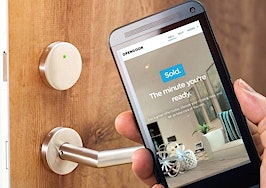- Homeowners are supposed to be able to use "Trade-In" to schedule a time to sell their home to Opendoor and buy a new one on the same day.
- The service, which makes 'instant offers' to sellers, can benefit a buyer the most if she uses Opendoor's preferred lender and purchases a home used by Opendoor.
- Well under 2 years old, Opendoor has raised $110 million. It bought 500 homes in its first year.
One big hurdle for homebuyers is that they often have to sell the home they live in before they can purchase a new one.
Opendoor, an exceptionally well-funded startup that makes “instant offers” on homes and then flips the properties of sellers who accept the offers, has unveiled a service designed to solve the problem.
Opendoor’s “Trade-In” lets homeowners sell their current home to Opendoor and buy a new home simultaneously. Sellers can pick a date when they can both close on the sale of their home to Opendoor and complete the purchase of a new one.
Headquartered in San Francisco, Opendoor is basically a tech-turbocharged home flipper. (CEO Eric Wu prefers the label “re-saler,” since, unlike many home flippers, Opendoor doesn’t target homeowners in a bind, he says.)
The startup uses automated valuation models (AVMs) to make “instant offers” on homes to sellers who ask for them, buys properties from sellers who accept those offers in a matter of days, spruces them up and then sells them. Opendoor charges anywhere from a 7 percent to 12 percent commission to sellers for this service, depending on how much the startup thinks it will cost to hold and sell the home it’s offering to buy.
It’s worth noting that Opendoor doesn’t consider its fee to be a commission, but rather a “charge.” That’s because Opendoor does not act on behalf of a seller as a real estate licensee, like an agent does. It just buys the seller’s home, and charges a fee for doing it quickly.
“.. traditionally only a licensee can charge a ‘commission’ for acting on behalf of another,” Wu said. “Opendoor is not acting on behalf of another, and thus this is not a traditional “commission.”
One out of three homeowners who request an offer from Opendoor end up accepting it, according to Wu.

Opendoor’s explainer page on ‘Trade-In’
Opendoor has made a splash in Phoenix since launching there in December 2014. It bought around 500 homes in its first year in business and sold about 300, according to Wu. Opendoor owned 225 homes in Phoenix on Tuesday, up from 144 on Sept. 10 2015, according to the Maricopa County Assessor’s Office.
The startup has been fueled by an eye-popping amount of funding: It had raised $110 million less than a year after going live. Opendoor recently expanded to Dallas, Texas.
Coming after Opendoor’s debut of a home-shopping platform, “Trade-In” marks Opendoor’s latest push to extend the convenience it’s brought to sellers to buyers.
How Opendoor ‘Trade-In’ works
Half of homebuyers have to sell their existing home before they can purchase a new home, according to Opendoor. That’s because, due to lending requirements, they often can’t clinch a mortgage for a new home until they’ve paid off their previous mortgage. And they can only pay off their previous mortgage once they’ve sold their previous home.
Homeowners who use “Trade-In” to buy a new home can get a mortgage from Opendoor’s “preferred lender” (which Opendoor declined to name) or from any other lender.
If buyers use “Trade-In” to purchase a home that’s pricier than their previous one, they generally would have to bring “additional capital” to a closing, Wu said. But if they used “Trade-In” to downsize, they should net some cash, in acknowledgement of the difference between the price of their previous home and the price of their new one.
Asked how “Trade-In” could work with any lender besides Opendoor’s preferred lender, Wu responded by email that it had built the “product, software, and operations to ensure the homeowner can close on his/her new home with one simple transaction.”
He added that Opendoor offers a “Late Checkout” option, “the ability to leaseback the home, to homeowners for any delays that may occur during the closing or moving process.”
Evan Moore, vice president of product at Opendoor, said in an interview that “there are other parties that can create friction” when a “Trade-In” involves lenders other than Opendoor’s preferred lender.
Preferred lender vs. other lenders
But if a buyer uses Opendoor’s preferred lender, “Trade-In” can fire on all cylinders.
“The homeowner selects the home, works with our lender, picks a move-in date and we take care of the rest,” Wu said. “Behind the scenes, we are handling the necessary logistics to ensure both closes can happen on the preferred move-in date.”

Opendoor’s ‘Trade-In’ price request page.
Loans made to “Trade-In” buyers by Opendoor’s preferred lender wouldn’t differ by interest rate or required down payments from typical mortgages, Wu said.
They could be both “conventional” — mortgages backed by Fannie Mae or Freddie Mac or insured by the Federal Housing Administration — or “unconventional” — mortgages kept on a lender’s books or sold to private investors without involvement from government-backed entities.
“Just to clarify, the innovation here isn’t yet around the financing piece but our product experience and operational ability to deliver on a seamless, same-day transaction,” Wu said.
Asked what flexibility or concessions Opendoor’s preferred lender might provide to borrowers that could streamline transactions, Wu said that Opendoor’s preferred lender evaluates a borrower’s eligibility for a loan based on the debt-to-income ratio the borrower is anticipated to have after she sheds the mortgage attached to the property she will sell to Opendoor (not the debt-to-income ratio she has before she pays off mortgage on the property she will sell to Opendoor).

Opendoor listing page for one of its properties includes a ‘Trade-In Price’ in the lower right-hand corner.
In an announcement, Opendoor cited a buyer who purportedly used “Trade-In.”
“I didn’t have to negotiate two times,” the buyer, identified as Nagarajan Murugan, was quoted as saying. “I was just moving from one place to the next.”
How agents factor in
Opendoor employs salaried listing agents to market its properties, and it offers a 3 percent commission to buyer’s agents through the local multiple listing service (MLS) for bringing a buyer to the closing table.
If a seller who hasn’t listed her home on the MLS requests and accepts an instant offer from Opendoor, the home would sell off the the multiple listing service (MLS). The seller would have never had any reason to list it there.
Opendoor will buy homes from sellers working with listing agents so long as the seller pays Opendoor the commission specified in its offer, on top of the seller’s listing agent’s commission.
On its website, the startup advises sellers with listing agents who want to accept an instant offer to keep in mind that their listing agent’s commission “will also be deducted from your net proceeds.”
“You only have to pay the listing commission; our resale costs replace the buyer agent commission,” adds the startup.
Opendoor also encourages listing agents to request instant offers on their clients’ homes to present to their clients.
When Opendoor has sold homes, the startup has nearly always first listed them on the MLS, offering a 3 percent offer of compensation to buyer’s brokers who bring a buyer to a sale, according to Wu.
The startup does, however, market listings on its website and through email before posting them in the MLS, offering a chance for buyers to snatch up homes before they’re syndicated to various listing sites.
Opendoor says its listings go under contract 10 days faster than the market average.
It also says its “24/7 open house” technology, which enables prospective buyers to text a number for a code to unlock the doors of its listings, boosts foot traffic to the properties it’s selling. The startup says its average listing receives 50 visits.
Why varying commission rates?
Opendoor used to make offers on homes that it admitted were a bit lower than market value, while charging a fixed commission of 5.5 percent to every seller.
The startup says it now buys homes at their full market value — not a discount — but it also charges a higher commission: anywhere from 7 to 12 percent. Sellers with homes that are likely to cost more and take longer to sell get charged a steeper commission than those whose homes will be easier for Opendoor to flip.
By tailoring the commission to cover anticipated selling costs, rather than offsetting those costs by purchasing a home for less than it might be worth, the variable pricing structure allows Opendoor to make offers that are more competitive — at least before factoring in commission — with offers that sellers might receive from conventional buyers.
“We wanted to be focused on delivering an offer at market value,” Wu said, when asked why Opendoor switched up its pricing model. The change allows Opendoor to be “very competitive for homes that have low market risk or low cost structures,” he said.
What’s next for Opendoor?
The startup will continue to look for ways to bundle together products, like financing and home warranties, that buyers have typically had to acquire separately from various parties, Wu said.
“If we got everyone to use our ecosytem of services, we can control the experience end to end, which would be fantastic,” said Moore, Opendoor’s vice president of product. “That’s the direction we’re moving towards.”
This helps explain why both Wu, a co-founder of Opendoor, and Khosla Ventures — one of Opendoor’s biggest investors and a firm that lists one of Opendoor’s other co-founders, Keith Rabois, as a partner — have both backed Roofst0ck.
Armed with $13 million in funding, Roofstock recently launched to allow investors to buy and sell single-family rental properties like stocks. Its listings feature pre-vetted properties with rent estimates, “lease and tenant summaries” and non-negotiable prices, along with access to lenders and property management firms.
Wu said he couldn’t speak to how his and Khosla Venture’s investments in Roofstock might eventually benefit Opendoor.
Editor’s note: This story has been updated to note that Opendoor prefers the label “re-saler” over “home flipper” and does not consider the fee it charges to be a “commission.”















![How hybrid brokerages are changing real estate [Special Report]](https://inman-www.imgix.net/wp-content/uploads/2015/07/hybridreportheader-1024x454.jpg?fit=crop&crop=entropy&w=266&h=188&usm=20&usmrad=4&auto=format)


![How hybrid brokerages are changing real estate [Special Report]](https://inman-www.imgix.net/wp-content/uploads/2015/07/hybridreportheader-1024x454.jpg?fit=crop&crop=entropy&w=70&h=70&usm=20&usmrad=4&auto=format)


